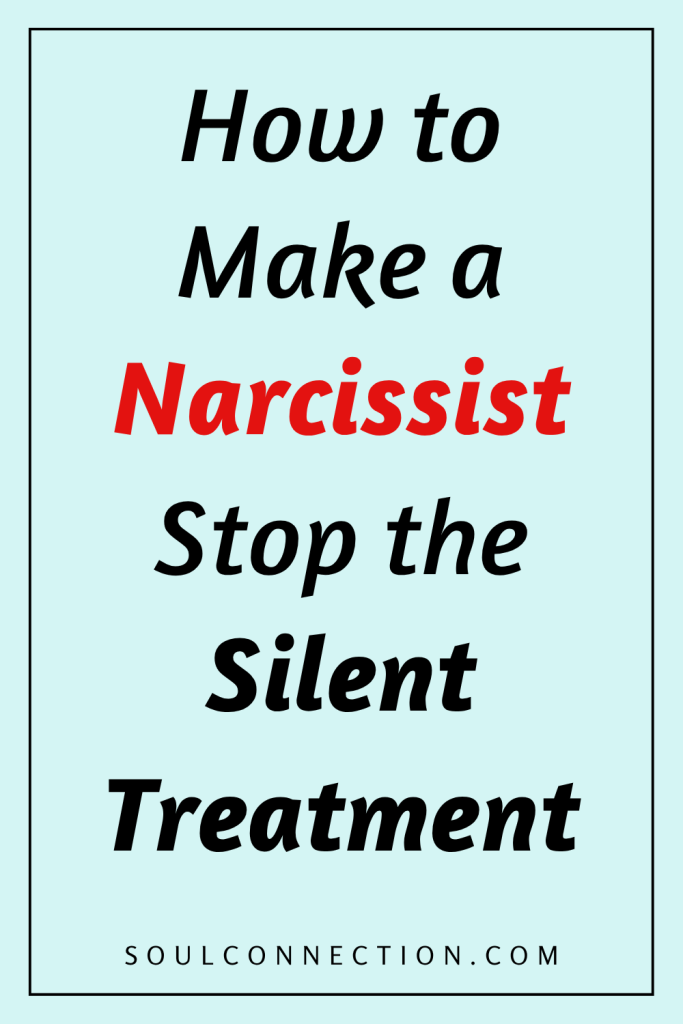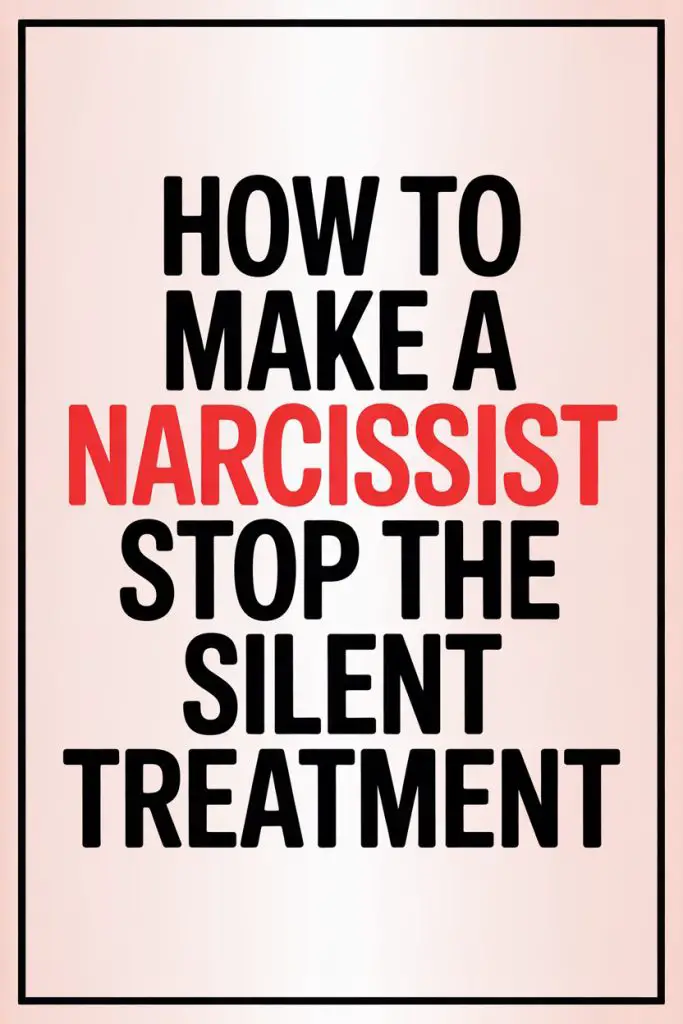Nobody signs up for the Silent Olympics when they fall in love, yet here you are: stuck with a partner who wields silence with the skill of a ninja and the subtlety of a sledgehammer.
The silent treatment can feel like emotional waterboarding, especially when it’s coming from someone with a knack for narcissistic games.
If you’re wondering how to make a narcissist stop the silent treatment, pull up a chair—preferably one that swivels, for dramatic effect—and settle in for a mix of tough love, real talk, and a few tricks that might just make life feel a bit less like a hostage negotiation.
Why Narcissists Love the Silent Treatment
Narcissists don’t do things by halves. If there’s drama to be had, they’ll take the scenic route—preferably in a convertible, with the wind in their hair, and your emotional well-being tied up in the trunk.
The silent treatment isn’t just a grown-up version of “I’m taking my ball and going home”; it’s a power move.
Withholding communication is all about control. Narcissistic partners use it to punish, manipulate, or push you into chasing after their affection.
Watching you squirm? That’s half the fun. Knowing you’ll do anything to break the silence? Even better.
Once you see what’s really going on, it gets a tad easier to avoid falling into their trap.
Don’t Feed the Beast
The Number One Rule of Surviving Narcissist Silent Treatment Club: Don’t beg, plead, or perform an interpretive dance to coax a response.
Narcissists thrive on attention. If you chase them, apologize for things you don’t even remember doing, or camp outside the bathroom door with a peace offering, you’re rewarding the behavior. (Yes, that counts even if the peace offering is chocolate.)
Resist the urge to fill the silence. Carry on with your life. Read a book. Walk the dog (or, you know, your sanity). Act unbothered, even if you’re dying inside. The less you react, the less fun it is for them.
Set Clear Boundaries Without Drawing a Battlefield
Communicating with a narcissist is a bit like playing chess with someone who moves the pieces when you’re not looking. Boundaries are your pawns, rooks, and queens—except no one gets to sweep them off the board but you.
Silence is meant to make you feel anxious and desperate.
Show the narcissist that you won’t engage unless there’s mutual respect. Calmly say, “I’m happy to talk when you’re ready to be respectful.” Then actually leave the room. (Dramatic exits are encouraged.)
Boundaries are about your behavior, not controlling theirs. They’re free to sulk or stew; you’re free to spend your evening binge-watching true crime documentaries in peace.
Stay Calm and Don’t Take the Bait
One thing narcissists are great at? Poking until you explode. When the silent treatment drags on, it’s natural to want to shake them and demand, “What’s your problem?!”
They’re banking on you doing exactly that.
Keep calm. Don’t rant, shout, or send a novel-length text about your feelings. This isn’t the time to pour your heart out or stage an intervention. Every outburst feeds their sense of control.
Instead, take a walk, phone a mate, or—if you’re feeling especially brave—write a letter you never send. Let them stew in their own silence.
Address the Behavior, Not the Drama
A narcissist will do their best to keep you tangled up in the “why.” Why are they upset? What did you do wrong? Is it the thing you said last week, or the thing you didn’t do yesterday?
Spoiler: It’s none of those things. The silent treatment isn’t about what you did; it’s about pulling your strings.
Call out the behavior with simple statements. Not a tearful monologue, just a neutral observation: “I notice you aren’t speaking to me. This hurts and I’d like to resolve it when you’re ready to talk.” Then move on.
By refusing to play detective, you rob the silent treatment of its power.
Avoid Apologizing Just to End the Silence
Apologies are sacred, like the last biscuit in the tin. Don’t hand them out just to restore the peace.
Narcissists love a forced apology—it lets them feel right and righteous. If you apologize for things you didn’t do, you’re setting yourself up for more silence next time you step out of line (or just breathe the wrong way).
Apologize only when you genuinely messed up. Otherwise, keep your dignity—and your biscuits.
Focus on Self-Care Like a Pro
Surviving the silent treatment is less about fixing the narcissist and more about looking after yourself.
Tap into whatever makes you feel sane: a night out with friends, a new hobby, or an extra scoop of ice cream (or three). Reconnect with people who lift you up instead of spinning you in circles.
Self-care isn’t just bubble baths and scented candles (though, let’s be honest, they help). It’s about proving to yourself that your happiness isn’t tied to somebody else’s mood swings.
Don’t Try to “Win” the Game
Narcissists set traps with the silent treatment: Who will break first? The answer shouldn’t be you, but it also shouldn’t be a competition.
Trying to beat them at their own game gives the drama a starring role in your life. Instead, step out of the arena. Show them that you’re not interested in playing Relationship Hunger Games.
Indifference is your secret weapon. The less you care about “winning,” the more you disrupt the pattern.
Consider the Bigger Picture
If silent treatment is a “sometimes food” in your relationship—like deep-fried Mars bars—things might be salvageable. But when it’s the only item on the menu, the problem goes deeper.
Narcissistic partners rarely change because someone else asked nicely. If you’re constantly walking on eggshells, losing sleep, or explaining away their behavior to friends, it might be time for a reality check.
No one deserves to live in someone else’s emotional freezer. Sometimes, making them stop the silent treatment means showing them the door.
When to Seek Help
Stuck in a cycle of silent treatment that’s left your self-worth looking like a trampled garden? This isn’t something you need to wrestle with alone.
A therapist (yours, not theirs) can help you untangle the mess and set healthier boundaries. Friends can give you perspective—and, if nothing else, a glass of wine and a shoulder to cry on.
Support is a sign of strength, not weakness.
Moving Forward with Your Voice Intact
Dealing with a narcissist’s silent treatment is about reclaiming your sanity, not scoring points. Silence can be a weapon, but it loses its sting when you refuse to play along.
Prioritize your peace, shore up your boundaries, and remind yourself that your voice is worth hearing—even if someone else is determined to pretend you don’t exist.
And if all else fails, silence can be golden.
Especially when it means you finally get to choose what’s on the telly.


